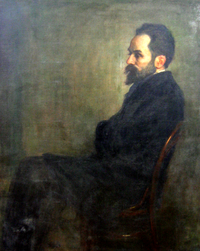You can help expand this article with text translated from the corresponding article in Polish. (November 2013) Click [show] for important translation instructions.
|
Stefan Żeromski ( [ˈstɛfan ʐɛˈrɔmski] ⓘ; 14 October 1864 – 20 November 1925) was a Polish novelist and dramatist belonging to the Young Poland movement at the turn of the 20th century. He was called the "conscience of Polish literature".[1]
Stefan Żeromski | |
|---|---|
 Żeromski (pastel by Kazimierz Mordasewicz, 1909) | |
| Born | 14 October 1864 Strawczyn, Kingdom of Poland |
| Died | 20 November 1925 (aged 61) Warsaw, Poland |
| Pen name | Maurycy Zych, Józef Katerla, Stefan Iksmoreż |
| Occupation | Writer |
| Nationality | Polish |
| Notable works | Przedwiośnie Ludzie bezdomni Popioły Syzyfowe prace |
| Spouse | Anna Zawadzka Oktawia Radziwiłłowicz |
| Children | Monika Żeromska Adam Żeromski |



He also wrote under the pen names Maurycy Zych, Józef Katerla, and Stefan Iksmoreż.
He was nominated four times for the Nobel Prize in Literature.[2]
Life
editThis section needs expansion. You can help by adding to it. (July 2018) |
Stefan Żeromski was born on 14 October 1864 at Strawczyn, near Kielce.
On 2 September 1892, he married a widow, Oktawia Rodkiewicz, née Radziwiłłowicz, whom he had met at a spa in Nałęczów, co-owned by her stepfather. One of the witnesses at the wedding was the novelist Bolesław Prus, an admirer of Oktawia's who had not been in favor of the marriage.[3]
The newlyweds moved to Switzerland, where Żeromski worked from 1892 to 1896 as a librarian at the Polish National Museum in Rapperswil . At Oktawia's request Prus, though no admirer of Żeromski's writings,[4] helped the struggling couple as much as he could.
In 1913 Żeromski started a new family with the painter Anna Zawadzka, whom he had met in 1908; they had a daughter, Monika.
In 1924, in recognition of Żeromski's achievements, President Stanisław Wojciechowski gave him a three-room apartment on the second floor of Warsaw's Royal Castle.[5]
In the same year, Żeromski was shortlisted for the Nobel Prize in literature.[6]
He died on 20 November 1925 in Warsaw.
Selected works
edit- Twilight (Zmierzch, short story, 1892)
- Ravens and Crows Will Peck Us to Pieces (Rozdziobią nas kruki, wrony, 1895)
- Doctor Peter (Doktor Piotr, 1895)
- The Labors of Sisyphus (Syzyfowe prace, 1898), about 19th- and 20th-century Tsarist efforts to russify the Russian-occupied part of Poland)
- Homeless People (Ludzie bezdomni, 1899)
- Ashes (Popioły, 1904)
- Forest Echoes (Echa leśne, 1905)
- The Wages of Sin (Dzieje grzechu, 1908)
- Elegy for a Hetman (Duma o hetmanie, 1908)
- The Rose (Róża, 1909)
- Sułkowski (1910)
- The Faithful River (Wierna rzeka, 1912)
- The Charm of Life (Uroda życia, 1912)
- Struggles with Satan (Walka z szatanem, vols. 1-2, 1916; vol. 3, 1919)
- Wind from the Sea (Wiatr od morza, 1922)
- My Quail Has Fled (Uciekła mi przepióreczka, 1924)
- Seedtime (Przedwiośnie, 1924)
- Journals (Dzienniki, published posthumously, 1953-1956)
Żeromski's works have been translated into several languages. They have been translated into Croatian by a member of the Croatian Academy, Stjepan Musulin.
Films
editSeveral of Żeromski's novels have been filmed, by Walerian Borowczyk (Dzieje grzechu, "A Story of Sin"), Andrzej Wajda (Popioły, "Ashes"), and Filip Bajon (Przedwiośnie, "The Spring to Come"). In 2000, The Labors of Sisyphus (Syzyfowe prace), was adapted into a film of the same name by Paweł Komorowski.
See also
editNotes
edit- ^ The Lublin Province Museum: Stefan Żeromski Archived 2011-08-15 at the Wayback Machine
- ^ "Nomination Database". www.nobelprize.org. Retrieved 2017-04-19.
- ^ Monika Piątkowska, Prus: Śledztwo biograficzne (Prus: A Biographical Investigation), Kraków, Wydawnictwo Znak, 2017, ISBN 978-83-240-4543-3, p. 466.
- ^ Monika Piątkowska, Prus: Śledztwo biograficzne (Prus: A Biographical Investigation), Kraków, Wydawnictwo Znak, 2017, ISBN 978-83-240-4543-3, p. 358.
- ^ Aleksander Gieysztor, Stanisław Herbst, Stanisław Lorentz, Władysław Tomkiewicz, Jan Zachwatowicz, Zamek Królewski w Warszawie (Warsaw's Royal Castle), Warsaw, Państwowe Wydawnictwo Naukowe, 1972, p. 173.
- ^ Polish culture: The Stefan Żeromski Museum at www.culture.pl
References
edit- Irena Kwiatkowska-Siemieńska, Stefan Żeromski. La nature dans son expériences et sa pensée (Stefan Żeromski: Nature in His Experiences and Thought), Préface de Jean Fabre, Professeur à la Sorbonne (Preface by Jean Fabre, Professor at the Sorbonne), Paris, Nizet, 1964 (256 pp.).
- Mortkowicz-Olczakowa, Hanna (1961). Bunt wspomnień. Państwowy Instytut Wydawniczy.
External links
editMedia related to Stefan Żeromski at Wikimedia Commons
- Works by Stefan Żeromski at Project Gutenberg
- Works by or about Stefan Żeromski at the Internet Archive
- Works by Stefan Żeromski at LibriVox (public domain audiobooks)